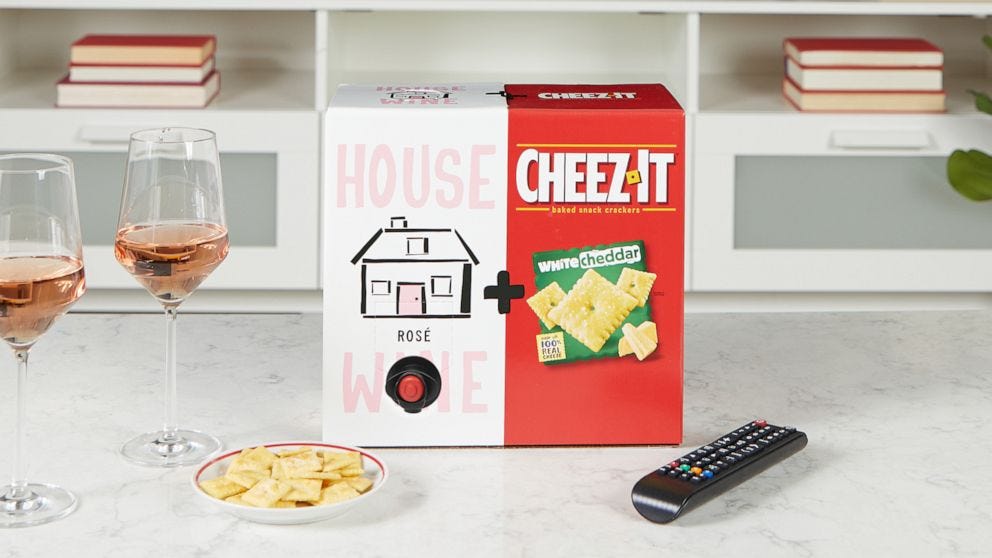
Content warning: diet talk. Brief mention of binge eating
I was unloading groceries one evening when my husband, Ryan, came into the kitchen, pointed at the box I was holding and said, “Since when do we buy Cheez-Its?”
I gave him a patient smile and started to explain the BRAND-NEW THEORY that was sure to FIX our kids’ chronic pickiness—our family was going to practice intuitive eating.
“There are no ‘bad’ foods!” I proclaimed. “There are no restrictions! Everyone can eat whatever they want whenever they want to and gradually, as we let go of our restrictive mindsets and learn to pay attention to our bodies, we’ll gravitate towards the foods our bodies need!”
Somehow, Ryan was not convinced. Maybe he was envisioning the likely outcome of our children subsisting solely off a diet of Lucky Charms and hot dogs.
“What do you mean ‘no restrictions’?” he asked. “There will always be restrictions.”
I shook my head. “Nope. If they ask for it, I just buy it. And if T only wants to eat Oreos, that’s okay. After a while, he’ll get sick of Oreos and start liking other foods,” I replied, trying to convince myself.
“Yeah, but you’re not buying every food in the grocery store. Or every food in existence. We have limited money and limited storage space. Aren’t those restrictions?”
This was not going like the Burnt Toast episode I’d listened to.
I’d been drawn to intuitive eating because certain aspects rang true to me: that weight stigma is harmful, that willpower is finite. Hadn’t I spent years attempting some awful diet or another, never achieving comfort with food or my weight? Maybe it was just time to accept the weight I was at and allow myself to binge Cheez-Its until they lost their power over me.
But Ryan’s question nagged at me. Is it actually possible to eliminate restrictions? Is life just one series of restrictions after another? In writing, having restrictions is generally helpful—narrowing one’s focus tends to lead more swiftly towards inspiration. I also thought about board games. As we’ve taught our kids to play games, we insist that they follow the rules, even though they often get irritated by them and long to cheat or quit. (I know the feeling!) But the promise of games is that accepting the restrictions of rules actually leads to more fun than just doing whatever we want.
For many of us that grew up in high-control religions, restrictions have really hurt us. Our normal human development (such as questioning authority or experiencing sexual feelings) was demonized and restricted via harsh rules and the threat of shaming. If that’s you, I’m so sorry that happened and it makes sense why you might have an aversion to restrictions now. Following the work of Dr. Marlene Winnell, I can recommend that you ask yourself two questions about your experiences: “What happened?” and “How does that continue to affect me?”
After such experiences, it can be tempting to throw off all restrictions—to go from having a hyper-restrictive diet to eating, say, an entire box of Cheez-Its right before going to dinner. Yet, neither approach actually feels like freedom, more like different flavors of compulsion—either towards perfectionism or hedonism. Where is the middle way? And why is it so hard to find?
I still haven’t given up entirely on intuitive eating as a concept—maybe just the way it was presented to me. Or maybe expecting humans to use our limited willpower to outwit a corporatized food system where conglomerates are pouring billions of dollars annually into making their ultra-processed foods as addictive as possible is a fool’s errand? Personally, I’ve come to accept that restrictions will always be a part of how I eat, even as Cheez-It continues to innovate:
Limiting ultra-processed foods continues to be a challenge for both myself and my kids, and yeah, they still prefer Cinnamon Toast Crunch to broccoli. But I’m hopeful that, by laying out guidelines and offering choices, they’ll eventually internalize an understanding of how to feed themselves well.
BONUS MATERIALS:
do you have a fav approach to feeding yourself/your kids? I keep coming back to the Ellyn Satter method, even though I also still secretly wish I could force feed my kids. (DANG IT, THAT CHICKEN TOOK ME OVER AN HOUR TO MAKE!!!)
here’s a helpful, non-shamey documentary on why ultra-processed foods are quite devious





"This was not going like the Burnt Toast episode I’d listened to" made me LOL. Great writing.
Perhaps cheezits need to belong to a special category 😜